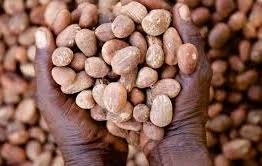The Alliance for Economic Research and Ethics has urged the Federal Government to create a clear transition plan and consult widely with stakeholders before going ahead with its ban on raw shea nut exports.
The Chairman of the group, Mr. Dele Oye, said in a statement that while the government’s policy direction on shea nut industrialisation is commendable, it must not be implemented suddenly without room for adjustment. He warned that an immediate reversal of the current export process could disrupt ongoing investments, frustrate exporters and processors, and affect thousands of Nigerians whose livelihood depends on the shea value chain.
Oye explained that Nigeria has the potential to grow its shea nut industry into a multi-billion-dollar sector. He noted that the global shea industry is worth about $6.6 billion, and Nigeria has what it takes to compete strongly if policies are properly designed and implemented. According to him, the new policy can lead to rural development, women empowerment, and industrial growth, but poor communication and rushed enforcement may cause unintended damage.
The Alliance Chairman, who is also a former President of the Nigerian Association of Chambers of Commerce, Industry, Mines and Agriculture (NACCIMA) and past Chairman of the Organised Private Sector of Nigeria, called for a phased approach. He insisted that the government must communicate timelines and expectations clearly, so that exporters and processors can make adjustments without losses.
Oye stressed that agencies of government need to provide details on available financing, workforce training programmes, technical support, and upgrading of local processing facilities. He added that such measures would encourage investors and processors to increase their capacity.
According to him, giving at least six months of transition would prevent the cancellation of international contracts and allow businesses to recover capital already invested in processing projects. “A staged implementation will avoid disruption and losses on existing local and international shea nut contracts. For many exporters and processors, this six-month window is a critical phase for capital recovery and project ramp-up,” he said.
Oye also advised that the Federal Government should consider intervening in the market by purchasing unsold stock and raw shea output during the transition period. He explained that such intervention would help processors, reduce smuggling, and encourage compliance with the new rules. He described this as a profitable venture for government that would protect small farmers and processors who are most vulnerable to sudden policy changes.
The trade expert pointed to experiences from Ghana, Malaysia, Indonesia, and India, where similar export policies were introduced gradually, giving room for producers to upgrade their operations and meet new quality standards. He said Nigeria should adopt the same model to avoid disrupting both local production and international trade relations.
Oye further noted that Nigeria’s success in shea nut industrialisation depends on how well the government manages capacity constraints, supply gaps, and existing trade obligations. He called for specific targets in the transition plan, including processing capacity, product quality standards, and diversification of export markets.
He explained that while the Alliance supports the industrialisation of shea processing in Nigeria, government must ensure that there is robust monitoring, feedback from stakeholders, and effective cooperation between multiple agencies.
“The Alliance believes in the potential of Nigeria’s shea industry and its capacity to contribute significantly to our economy. But we must approach policy changes with robust monitoring, stakeholder feedback and multi-agency cooperation,” Oye said.
The shea nut industry in Nigeria is dominated by rural communities, particularly women who are involved in harvesting and primary processing. Experts say that building local processing plants will create thousands of jobs and boost non-oil exports. However, industry watchers also warn that abrupt bans without preparation may push the trade underground and encourage smuggling to neighbouring countries.
The debate over shea nut export policy comes at a time when the Federal Government is trying to boost local production and expand Nigeria’s presence in global non-oil exports. Stakeholders believe that with proper planning, the shea nut sector can become one of Nigeria’s top agricultural exports, similar to cocoa and cashew
